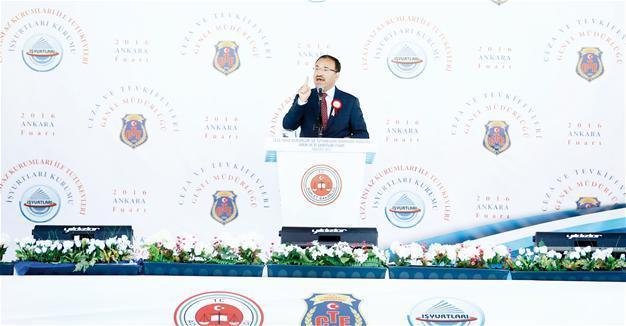Turkish gov’t to change laws for ‘efficient trials’ of coup plotters
Serkan Demirtaş - ANKARA

AA photo
The government is drafting a package of comprehensive changes in the criminal procedures act and the penal code in order to make the trials of July 15 coup plotters more efficient, Justice Minister Bekir Bozdağ has told reporters.
“The trials will take place in cities where the coup attempt crimes were committed. They will be held in many cities and districts. These trials will not be merged as this will only complicate the proceedings and turn them into a mess,” Bozdağ said on Oct. 9.
The first July 15 coup attempt trial has already started in Denizli, he stated, adding that although the main trials will take place in Ankara and Istanbul, other legs of the case will take place in different cities under separate indictments.
“If we were to merge all of these trials, we would never be able to conclude the case and come to a verdict,” Bozdağ said.
A group of high-ranking military officers loyal to the movement of U.S.-based Islamic scholar Fethullah Gülen, a friend turned foe of the Turkish government, attempted to seize power through a coup on the night of July 15, leaving 241 people dead and more than 2,000 wounded. The coup plotters bombed the parliament building in Ankara, the presidential palace, and the police special forces headquarters, while also attempting to kill President Recep Tayyip Erdoğan and other senior government officials. Declaring a state of emergency one week after the coup attempt, the government has introduced harsh measures against what it calls the Fethullahist Terror Organization (FETÖ), suspending and arresting tens of thousands of civil servants suspected of having links to the coup.
“A total of 34,063 people are currently detained either on charges of attempting to stage the coup or being a member of a terrorist organization. Legal procedures have been imposed against more than 76,000 people so far,” Bozdağ said.
Key legal changes
While investigations into the coup attempt are ongoing, the government is set to make changes to a number of key articles of the Penal Code and Criminal Procedures Act, in an attempt to streamline the trial process. These changes include the following:
- Laundering of assets acquired as a result of an offense will be moved from the Penal Code to Anti-Terror Law. As a result, those who commit this crime will receive a bigger punishment.
- Military personnel charged with terror crimes, or with attempting to stage a coup, will be imprisoned in civilian jails instead of military prisons. Military personnel will be handed to the judicial police and not to the military police after being caught.
- With a change in the criminal procedures act, trials will be able to be held in different locations within the boundaries of a certain jurisdiction.
- Courts will be able to assess the release appeals of those detained on terror accusations over the course of 15 days, instead of the current three days.
- If the court demands an additional testimony from the suspect, this will be able to be carried out by the police and not necessarily by the court.
- Judges will have the right to reject the defense’s demand to hear additional witnesses if they believe that this is simply an attempt to prolong the proceedings.
- Instead of reading the entire indictment at the beginning of trail process, prosecutors will be able to read a summary of the indictment.
Gov’t ‘waiting for opposition’s contributions’
Justice Minister Bozdağ said the government would likely submit the draft package to parliament this week.
“We are keen to have the package discussed at the sub-committees. We will welcome the opposition’s contribution to the package and we are ready to listen if they suggest changes,” he added.
